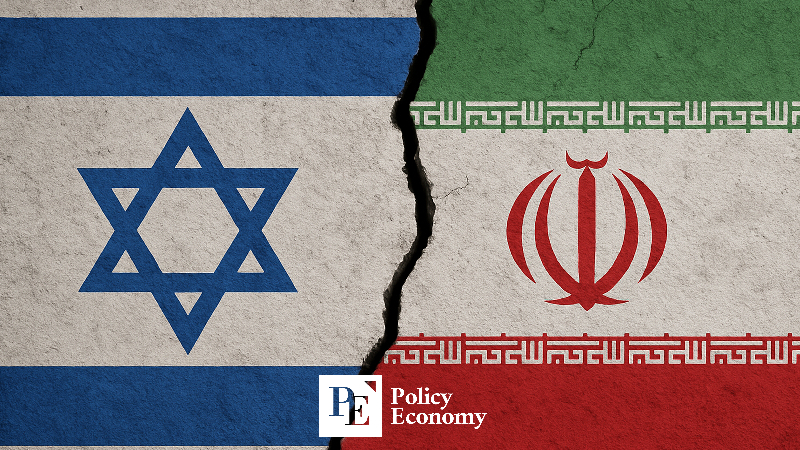"Is Full-Scale War Coming?" — Israel Launches Preemptive Strikes on Iran's Nuclear Facilities
Input
Modified
Israel Launches ‘Operation Waking Lion’ Stalled U.S.–Iran Nuclear Talks Trigger Airstrikes Expert: “A Full-Scale War Between the Two Countries Is Now a Real Possibility”

Israel has carried out a large-scale preemptive strike against Iran, marking a significant military escalation. The airstrikes come amid the near-collapse of nuclear negotiations between the United States and Iran, with Israel opting to directly target Iran’s nuclear facilities. Experts warn that the severity of this attack is substantial and suggest that a retaliatory strike from Iran could serve as the tipping point for a full-scale war between the two nations.
Operation "Rising Lion" Targets Nuclear and Military Sites
On the 13th (local time), Israel confirmed that it had launched a large-scale preemptive strike on Iran, deploying dozens of fighter jets to target several nuclear and military facilities. Israeli Prime Minister Benjamin Netanyahu declared, “We have launched Operation Rising Lion to repel Iran, which poses a threat to Israel’s survival,” adding that the airstrike struck the heart of Iran’s uranium enrichment infrastructure. He also stated that the targets included Iranian military commanders and missile program sites.
The Israel Defense Forces (IDF) acknowledged the preemptive attack, stating that they had completed the first phase of military strikes against Iran’s nuclear program. According to Iranian state media and Reuters, the airstrikes resulted in the deaths of IRGC commander Hossein Salami and two Iranian nuclear scientists.
In anticipation of retaliation, the Israeli government immediately closed its airspace and went on high alert. Tens of thousands of Israeli troops were mobilized, and the military announced a suspension of schools, public gatherings, and all non-essential activities. Israeli Defense Minister Israel Katz declared a state of emergency, warning that Iran could soon launch retaliatory drone and missile attacks.
Netanyahu: "We Will Not Be Victims of a Nuclear Holocaust"
The launch of Operation Rising Lion is rooted in Israel’s long-standing concern over Iran’s nuclear ambitions. After the strikes, Prime Minister Netanyahu claimed that Iran had already produced enough highly enriched uranium for nine nuclear bombs and could achieve weaponization within a matter of months. “This poses a clear and immediate threat to Israel’s survival,” he warned. Referencing history, he added, “Eighty years ago, Jews were victims of the Holocaust under the Nazi regime. Today, the Jewish state of Israel refuses to become the victim of a nuclear holocaust brought on by the Iranian regime.”
Israel’s decision to resort to military action comes after months of stalled nuclear negotiations between the U.S. and Iran. The Trump administration had initiated indirect talks with Tehran in April, holding five rounds of negotiations, but no significant progress was made. The core issue remains the disagreement over Iran’s right to enrich uranium. The U.S. insists on a ban, while Iran has firmly rejected any complete prohibition.
Even before the strike, international media had anticipated a possible Israeli attack. On the 12th, The Wall Street Journal (WSJ) cited multiple U.S. and Israeli government officials who said that if the nuclear talks failed, Israel could launch an attack on Iran within days. One senior Israeli official told WSJ, “If Iran does not halt its production of fissile material that could be used for nuclear weapons, another strike could occur as soon as the 15th.” That date coincides with the scheduled sixth round of indirect nuclear talks between the U.S. and Iran.
On the same day, President Donald Trump also acknowledged the rising risk of full-scale conflict in the Middle East. Speaking at a press conference at the White House, he remarked, “An Israeli attack on Iran is a real possibility. I don’t want to say it’s imminent, but it’s certainly something that could happen.” He added, “We’re still in a phase where diplomatic progress is possible. While an attack might undermine diplomatic efforts, it could also strengthen them in some ways.”

Israel Crosses Iran’s ‘Red Line’
Experts are warning that Israel’s latest strike could serve as a catalyst for an all-out war between the two countries. One diplomatic analyst noted, “This is the third time since October of last year that Israel has launched an attack on Iranian territory. Given the scale and severity of this most recent strike, the likelihood of escalation is much higher.”
On October 1 last year, Iran launched a large-scale missile attack on Israel, firing more than 180 missiles. At the time, Iran stated the strike was in retaliation for the death of a Hamas political leader in July, which occurred within Iranian territory. Most of the missiles were intercepted by Israel and its allies, with only a few reaching central and southern Israel.
Later that month, on October 26, Israel carried out a retaliatory strike on Iran, targeting air defense systems, missile production facilities, and other military infrastructure. Iranian authorities confirmed that various sites in Tehran, Khuzestan, and Ilam provinces were hit. However, they claimed that most of the Israeli attacks were successfully thwarted, and that only “limited damage” had occurred in some areas. Despite the exchange of military strikes, the overall damage remained relatively minimal.
This time, however, the situation appears far more serious. Israel directly targeted Iran’s nuclear facilities—a line Tehran has long declared as a clear red line, one that would provoke inevitable consequences if crossed. In response, the Iranian government swiftly issued a nationwide air defense alert and warned that it would firmly retaliate against Israel’s provocation.
Analysts suggest that Iran’s retaliation may not be limited to its own forces. There are growing concerns that Iran's regional allies—such as Hezbollah in Lebanon, the Houthi rebels in Yemen, and Shiite militias in Iraq—may join in, potentially triggering a broader regional conflict.





















